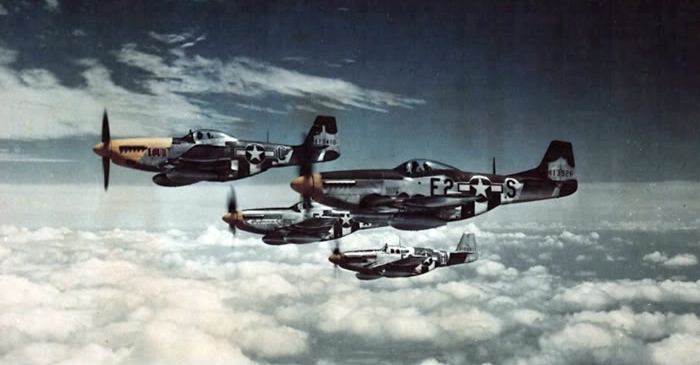The funeral ceremony was held at the Arlington Cemetery on 18th June 2015, with full military honours. The casket of 2nd Lieutenant John William Herb (22 years) was carried by a military team and accompanied by an escort platoon while the band, the colours party, and the firing party performed their duties. It was a most fitting burial for a WWII fighter pilot, holder of the Distinguished Flying Cross, a Purple Heart and three campaign medals – even though his mortal remains had only recently been found – almost 70 years after his plane came down in a wood.
John William Herb, born in 1922 in Ohio, went to Roxboro Junior High School in Cleveland Heights, after which he attended the Riverside Military Academy. He enlisted in November of 1942 and was stationed in Norfolk, England with the 368th Fighter Squadron and was assigned to the 359th Fighter Group.
On that fatal day, 13th April of 1945, military records show that John, together with two other fighter planes, was returning to England after having safely escorted bombers to Güstrow in Germany. The three pilots, noting some enemy aircraft parked in an airfield located in a clearing in the woods, grabbed the opportunity and, making several strafing passes over them, managed to destroy four enemy planes each – clocking up a remarkable total of 12 aircraft which they had totally disabled. However, during this sortie, the forward coolant scoop of John’s fighter plane (named Mary-Lou), was ripped off when it hit a tree. The engine ceased, and the P-51 crashed in a ball of fire, into the woods near Rosien.
That, however, was not the end of this story – for at the time of the accident, a five-year-old German boy from East Prussia, Manfred Römer, witnessed the crash and the burning aircraft. It made a huge impression on him, and those images remained with him, until finally, when reaching his 70s, he decided to look into this crash. He felt driven to try to find out what had happened to the pilot, for he had never been able to find out what had happened to his own father who had disappeared in Russia. He began to feel strongly that there would be a family in America which had to live with the same sort of grief as he had.
Römer started looking into the matter – perusing all likely records and writing to different authorities which might help his search. He found a lot of people became tight lipped about this accident, particularly when reference was made to the pilot, but at last two different witnesses related the same story. Römer followed up on the clues he had managed to unearth, and finally, he found the place in the woods where the crash had occurred.
With the aid of both the US and German authorities, it was finally established that Römer had located the remains of John Herb, but also – had in fact uncovered a war crime. The experts from the US, who look for fallen soldiers, arrived at the scene and found a full skeleton, with a bullet hole in the skull. The bones, well preserved, were still in the pilot’s uniform which was complete with a life jacket and the headphones. Even John’s 1940 class ring, with the initials JWH engraved on it, was found, still in the pilot’s finger bone.
A volunteer group, the Missing Air Crew Research Team, with a number of government agencies, worked on the case. After analyzing plane debris, interviewing witnesses and locating family members for DNA testing, they affirmed Herb’s identity which was further confirmed by dental records.
The story thus goes that John, having survived the crash, was discovered by enemy soldiers, was shot in the head and his body buried in a shallow grave nearby. Since there seems to have been a lot of misinformation concerning this particular crash – these remains were not discovered earlier.
Michael Herb, 62, (John’s nephew) reports that John’s parents had always been disturbed by the fact that all they knew was that John was missing in Germany. He (Michael), had often told the story to his children, never thinking he would ever be able to tell it to the end. However, after so long, it was Manfred Römer who finally laid the matter to rest. “This German, Manfred, who I’d never met before, just brought William home,” he said.
The war crime notwithstanding, the Herb family which has German heritage, has no bad feelings whatsoever towards Germany. After all, noted Michael, millions of people were killed in the Second World War, yet Manfred has managed to bring John home and thereby has shown that no matter who or where, the fate of every single person is important – even after more than 70 years.
